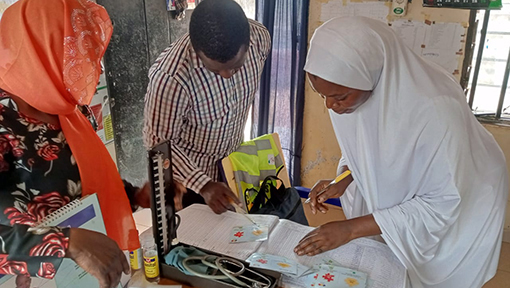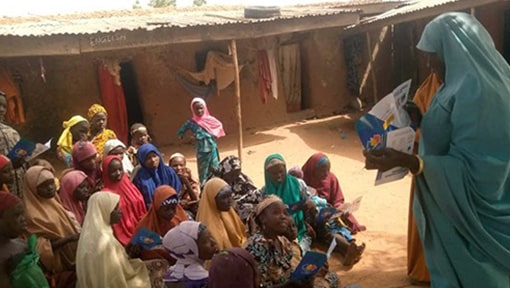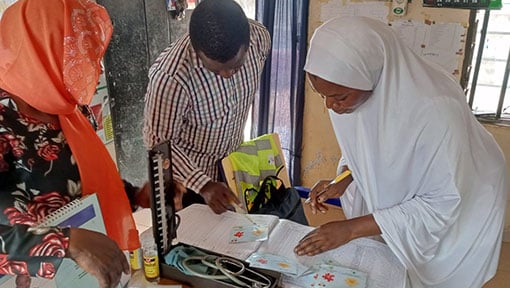TCI Coaches in East Africa Share Tips for Effective Coaching and Transfer of Skills
The Challenge Initiative (TCI) has developed and strengthened the capacity of a growing cadre of coaches at the local government level. These coaches adapt, implement, manage and monitor TCI’s proven family planning and adolescent and youth sexual and reproductive health (AYSRH) approaches. Each region in which TCI is being implemented has rolled out and institutionalized coaching to align with their unique contexts and city and health system structures. In East Africa, where TCI is implemented as Tupange Pamoja, TCI innovated a peer-to-peer learning and coaching strategy called Sisi-kwa-Sisi in Swahili, which translates loosely to “from us by us.”
Sisi-kwa-Sisi coaches, now numbering over 700, are drawn from and work across various levels – at the facility, city, hub, and global levels, and coaches are identified on a quarterly basis by local Program Implementation Teams, which are steering committees composed of city stakeholders and NGO partners. After completing training, information about the trained coaches is added to a database, comprised of coaches across the East Africa region – Kenya, Tanzania and Uganda – who can be called upon when their profile matches a city-determined need. Tupange Pamoja’s coaching approach emphasizes the importance of interpersonal communication skills alongside the technical knowledge required to be an effective coach.
Nancy Aloo, county manager for Migori and Nyamira counties in Kenya, shared her perspective as to what characteristics make an effective coach and how she is working to strengthen the capacity of public sector managers and implementers to not only implement the proven solutions but also serve as coaches to others. According to Aloo, Sisi-kwa-Sisi is coachee-centric, in that each session is designed to meet the specific needs of the coachee(s) and the geography in which they are embedded. As implementation has progressed, TCI’s coaches have responded to emerging needs in areas beyond TCI’s proven approaches, thereby expanding coaching to include broader program management competencies, such as coordination, cost-efficiency, financial management and data for decision-making. Most recently, TCI’s proven approaches accounted for 39% of Sisi-kwa-Sisi coaching sessions, while M&E and program management accounted for 41%.
How do they do it?
To ensure consistent, high-quality implementation, Tupange Pamoja’s coaches use this nine-step process to structure their coaching.
- Initiation
- Building rapport
- Problem identification
- Objective setting
- Exploring potential solutions
- Action planning
- Establishing measures of progress
- Identifying additional learning needs
- Wrap-up
However, there may be cases when a particular coachee is farther along in the process and may not need to go through each of the nine steps. Coaches must be carefully attuned to the needs of coachees and make adjustment to the process as they see fit.
TCI University (TCI-U) is the go-to resource for coaches. Because most TCI-U users – especially from East Africa – access it via their mobile devices, Tupange Pamoja developed TCI-U Thursdays, an interactive SMS campaign to drive increased use of TCI-U for sharing and learning. Since its February 2020 launch, this initiative has reached over 140 coaches across Tanzania and Kenya with tips and tricks to support implementation.
COVID-19 has provided an impetus and opportunity to further adapt Tupange Pamoja’s coaching strategy to local needs. In recent months, virtual coaching topics have focused on data collection and reporting and documentation of Most Significant Change and success stories. Facility providers and community health volunteers have benefited from coaching on national guidance for family planning service provision in the time of COVID-19, which includes facility practices to limit family planning client crowding, promote community-based distribution of pills and condoms and the use of personal protective equipment. Read more about East Africa’s response to COVID-19.
Ultimately, coaches use the Sisi-kwa-Sisi approach in all city engagements to move towards a singular objective: to motivate city governments to take the lead in their family planning and AYSRH programs.
The videos above feature interviews with Aloo, as well as TCI’s AYSRH lead in Tanzania, Waziri Njau, who explains how Tupange Pamoja’s standardized coaching process leads to improved outcomes and to the mindset shift required for government ownership of its family planning program. Peter Kagwe, TCI’s country lead in Kenya, is also featured and discusses how his leadership style impacts his approach to coaching.
Below are testimonials from Tupange Pamoja’s coachees:
After the Sisi-kwa-sisi coaching, our outreach numbers have multiplied by more than three times. The Sisi-kwa-sisi coaching was an eye opener because it helped us to identify the gaps that we were having in demand creation and service delivery. We have now started conducting targeted outreaches and we only integrated 2-3 other services to avoid losing focus. We are now referencing TCI-University tool kit to ensure that we are adopting what has proven to be the best practices. In our first community outreach after the coaching, we surpassed our target of 80 FP acceptors and instead achieved 391 FP acceptors followed by 285 FP acceptors in the consecutive outreach. Now more women and girls are being reached with family planning services hence reducing the number of unintended pregnancies, unmet need for FP which is translating to reduction of the maternal mortality.”
TCI coached us on provision of youth-friendly services. During the coaching, we were taught what works and what had been proven to work when engaging the youth. The results were immediately visible, partners started to ask what are you doing at your facilities? At one youth in-reach, we were able to attend to over 120 AYs with information and services. When we went on radio to talk about adolescent health, the questions were so many. This helped us plan for our outreaches and strengthen the community units. We decided to focus on what worked including finalizing our strategy were we even included some of the evidence-based interventions from TCI-U.”






